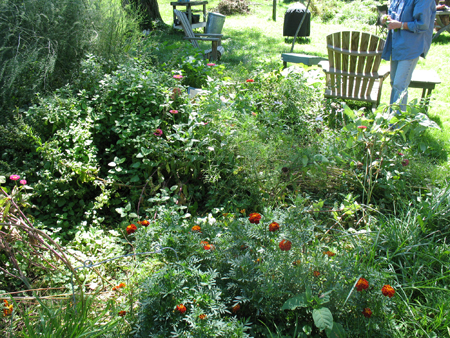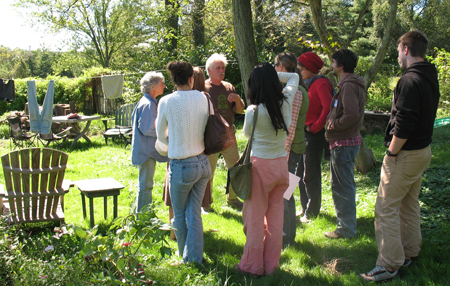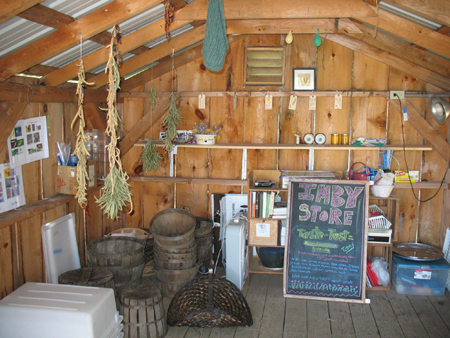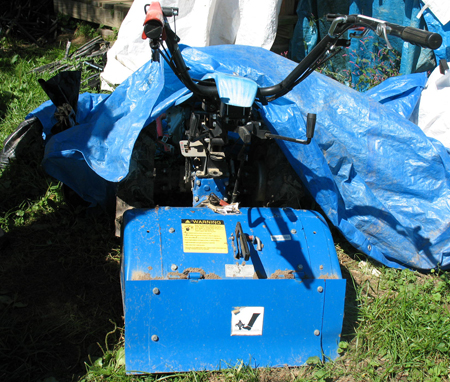September 19th, autumn is officially here. Sally and Jim Hammerman of IMBY at Misty Hollow won big points from the 7 interns (and me) who showed up on this lovely Saturday morning, by offering us a spread of dark french press coffee, herbal tea and donuts in their charming circa 1750 kitchen. Their 2 suburban acres in Westtown, PA backs up to a school soccer field and is jam packed with the fruits of their efforts from over the past six to ten years; vegetable and herb gardens, a mini-orchard of apples, pears, two young apricot trees, grape vines along with blackberry, raspberry, and blueberry bushes.

The couple began the workshop by serving refreshments and telling us a little about their respective backgrounds. Sally is an artist, teacher and nurse and Jim is also a teacher and self taught carpenter. Both avid gardeners finding themselves with quite a bit of surplus, they decided to begin a small CSA a few years ago, mostly just for family and friends. Beginning with just 10-12 members working as core members of the LLC based CSA, the Hammermans have expanded to about 30 members. They offer half or full shares and ask members to work either 40hrs or 80hrs respectively.

Sally and Jim originally required this work time commitment in exchange for a reduced shareholder buy-in. To fulfill the farm needs, however, they were 'policing' members' time in the garden. So at one of the first gatherings they held for members, they asked for suggestions on how to manage work time. The result was a tiered solution to be fair to both the farmers and the members; charge a top buy-in price which can be worked down over the growing season- or not, as each shareholder wishes. For those who do work, hours accumulate and they are paid back. It's not a 'living wage', but the satisfaction of participating in the garden seems to provide more than the money (Sally suggests that perhaps it could be called a 'wage to live by'). Although some of the work time is with other activities, 50% of it must be spent in the garden working. A sign-in sheet helps in tracking time and a CSA manual clarifies procedures.

Misty Hollow also sells value added products on the farm; honey from a local beekeeper, garlic, dried tomatoes, roasted peppers in oil, goat cheese, herbs, postcards and t-shirts. Sally grows an extensive herb garden and also offers herbal bath salts, a garlic salve called 'Goot' and herbal oils and vinegars. My Great Pumpkin, Kimberton Whole Foods and Pete's Produce are a few of the retail stores that offer Misty Hollow non-food products. Look for the Green Man or Garden Goddess logo. You can find this on their site .

There is a living space with bath above the workshop in the lovely barn that Jim built, fitted out with a pot bellied stove and friendly calico cats for company. They have had interns live there, and out of season, it's offered to guests and friends. There are farmer-in-training workshops offered for 8-11 year olds and 'Fun on the Farm' days for 4-7 year olds. Westtown school has been assisting Misty Hollow with these two programs.
For a fundraising event to raise money for their high tunnel greenhouse, the Hammermans held a 'Gaze and Graze' silent auction. They offered an automatic 20 work-hours to those members who organized and greatly helped in raising the much needed $2500. Among other things, friends donated an apartment for a NYC weekend, a restored boat house for a Vermont long weekend, and a Long Beach Island house for a relaxing week-at-the-beach. The result not only got the Hammermans their high tunnel, but it was a community building effort that has spilled over into their Fall Harvest and May Meet and Greet festivals.


Offering Tuesday and Friday pickups, Sally and Jim also devised a shareholders skill-set list that they give out to members for bartering or trading. The offerings range from Thai massage, Reiki therapy and hypnotism, to used cars and micro-lending progrms. There is even someone who runs an eco-village in Mexico with time shares available. It appears that you're only limited by your own imagination as to what you choose to sell, swap or trade.
Another facet of Misty Hollow's creative take on farming and sustainability are the wonderful workshops they offer. Pizza making, dandelion wine production, preserving, canning and making pies - they offer something for everyone's interests. There are also children's workshops that offer games; like presenting the kids with closeup photos and asking them to find the object on the farm.

One point brought up by Maysie's intern Erin Raser, was the importance of being centrally located. Jim admitted that their proximity to shopping centers and a large population doesn't hurt. We've heard this from other CSA host farmers as well, the advantage of high visibility. Another important point that Sally and Jim emphasized, is the advantage of running a smaller and more manageable CSA. It seems to allow them a creative latitude in developing ideas for promotions and community building efforts that we hadn't heard about from the larger scale farm CSA's reviewed in the SAITA workshops this season.
One of the current members, Anna, happened to be out in the garden working and we got to hear some of her reasons for joining Misty Hollow's CSA: she and her husband don't have enough knowledge or sun in their own yard to support a substantial amount of produce.
This way they get to participate in the growing process and also have a much wider variety of items than might be found in a grocery store or even a farmers market. If she does need to drive somewhere, nurseries and markets are nearby.

That's a 40 solar panel field array that provides 80% of the Hammermans' electricity. They bought the panels at a time when tax credits were offered and aggregators now combine solar credits for the property. The house also has a spring in the basement, providing fresh water and irrigation to the gardens. It's attractive to toads who eat more than their share of bad insects and are a welcome addition to any garden. Jim had two 150 gallon stock tanks joined together and plans for a third 300 gallon to give them 600 total. There is a small greenhouse for Sally's herbs, the high tunnel and a separate greenhouse with shed for starting seeds. Black plastic is used for weed control, but it's biodegradable and breaks down in one season.


The pick-up shed was an $1800 mail order package from Vermont's Jamaica Cottage, which has manufactured post and beam structures since 1995 and delivers the best looking chicken coops outside Lancaster, PA. Their Vermont cottage would make an awesome studio space for any artist.

The spiffy blue Italian made BCS 11 horsepower tiller has a Berta rotary plow attachment that Jim raved about. His rotation includes white clover, winter rye and oats that he's trying in one area. Always working towards sustainability, Jim and Sally follow the model of wasting nothing on the farm and ask members to return veggie residue and scraps for composting.

Other practices include storing kelp and fish emulsion in large drums near the cooler shed that houses a couple of old fridges, planting Russian comfrey at the base of apple trees for companion planting, and a software program exclusively designed for the CSA farmer, including ideas on what to plant and the ability to fax seed orders. I'm not sure that this is the same program from Back40Books, but it looks similar.
Many thanks to Jim and Sally for their gracious farm tour and the highly informative talk. (and the donuts) We learn so much from each and every farmer and there are new processes to discover at each workshop!
Stay tuned for the next SAITA presentation on Saturday September 26th, 11am to 1pm at Pennypack Farm. Topic will be Community Started Agriculture with a twist. Farms and CSA's begun by groups of regular folks. Three farms will be presenting.
Happy fall! See schedule and addresses for the last remaining workshops here.
Victoria Webb
SAITA Coordinator
vic@furiousdreams.com

The couple began the workshop by serving refreshments and telling us a little about their respective backgrounds. Sally is an artist, teacher and nurse and Jim is also a teacher and self taught carpenter. Both avid gardeners finding themselves with quite a bit of surplus, they decided to begin a small CSA a few years ago, mostly just for family and friends. Beginning with just 10-12 members working as core members of the LLC based CSA, the Hammermans have expanded to about 30 members. They offer half or full shares and ask members to work either 40hrs or 80hrs respectively.

Sally and Jim originally required this work time commitment in exchange for a reduced shareholder buy-in. To fulfill the farm needs, however, they were 'policing' members' time in the garden. So at one of the first gatherings they held for members, they asked for suggestions on how to manage work time. The result was a tiered solution to be fair to both the farmers and the members; charge a top buy-in price which can be worked down over the growing season- or not, as each shareholder wishes. For those who do work, hours accumulate and they are paid back. It's not a 'living wage', but the satisfaction of participating in the garden seems to provide more than the money (Sally suggests that perhaps it could be called a 'wage to live by'). Although some of the work time is with other activities, 50% of it must be spent in the garden working. A sign-in sheet helps in tracking time and a CSA manual clarifies procedures.

Misty Hollow also sells value added products on the farm; honey from a local beekeeper, garlic, dried tomatoes, roasted peppers in oil, goat cheese, herbs, postcards and t-shirts. Sally grows an extensive herb garden and also offers herbal bath salts, a garlic salve called 'Goot' and herbal oils and vinegars. My Great Pumpkin, Kimberton Whole Foods and Pete's Produce are a few of the retail stores that offer Misty Hollow non-food products. Look for the Green Man or Garden Goddess logo. You can find this on their site .

There is a living space with bath above the workshop in the lovely barn that Jim built, fitted out with a pot bellied stove and friendly calico cats for company. They have had interns live there, and out of season, it's offered to guests and friends. There are farmer-in-training workshops offered for 8-11 year olds and 'Fun on the Farm' days for 4-7 year olds. Westtown school has been assisting Misty Hollow with these two programs.
For a fundraising event to raise money for their high tunnel greenhouse, the Hammermans held a 'Gaze and Graze' silent auction. They offered an automatic 20 work-hours to those members who organized and greatly helped in raising the much needed $2500. Among other things, friends donated an apartment for a NYC weekend, a restored boat house for a Vermont long weekend, and a Long Beach Island house for a relaxing week-at-the-beach. The result not only got the Hammermans their high tunnel, but it was a community building effort that has spilled over into their Fall Harvest and May Meet and Greet festivals.


Offering Tuesday and Friday pickups, Sally and Jim also devised a shareholders skill-set list that they give out to members for bartering or trading. The offerings range from Thai massage, Reiki therapy and hypnotism, to used cars and micro-lending progrms. There is even someone who runs an eco-village in Mexico with time shares available. It appears that you're only limited by your own imagination as to what you choose to sell, swap or trade.
Another facet of Misty Hollow's creative take on farming and sustainability are the wonderful workshops they offer. Pizza making, dandelion wine production, preserving, canning and making pies - they offer something for everyone's interests. There are also children's workshops that offer games; like presenting the kids with closeup photos and asking them to find the object on the farm.

One point brought up by Maysie's intern Erin Raser, was the importance of being centrally located. Jim admitted that their proximity to shopping centers and a large population doesn't hurt. We've heard this from other CSA host farmers as well, the advantage of high visibility. Another important point that Sally and Jim emphasized, is the advantage of running a smaller and more manageable CSA. It seems to allow them a creative latitude in developing ideas for promotions and community building efforts that we hadn't heard about from the larger scale farm CSA's reviewed in the SAITA workshops this season.
One of the current members, Anna, happened to be out in the garden working and we got to hear some of her reasons for joining Misty Hollow's CSA: she and her husband don't have enough knowledge or sun in their own yard to support a substantial amount of produce.
This way they get to participate in the growing process and also have a much wider variety of items than might be found in a grocery store or even a farmers market. If she does need to drive somewhere, nurseries and markets are nearby.

That's a 40 solar panel field array that provides 80% of the Hammermans' electricity. They bought the panels at a time when tax credits were offered and aggregators now combine solar credits for the property. The house also has a spring in the basement, providing fresh water and irrigation to the gardens. It's attractive to toads who eat more than their share of bad insects and are a welcome addition to any garden. Jim had two 150 gallon stock tanks joined together and plans for a third 300 gallon to give them 600 total. There is a small greenhouse for Sally's herbs, the high tunnel and a separate greenhouse with shed for starting seeds. Black plastic is used for weed control, but it's biodegradable and breaks down in one season.


The pick-up shed was an $1800 mail order package from Vermont's Jamaica Cottage, which has manufactured post and beam structures since 1995 and delivers the best looking chicken coops outside Lancaster, PA. Their Vermont cottage would make an awesome studio space for any artist.

The spiffy blue Italian made BCS 11 horsepower tiller has a Berta rotary plow attachment that Jim raved about. His rotation includes white clover, winter rye and oats that he's trying in one area. Always working towards sustainability, Jim and Sally follow the model of wasting nothing on the farm and ask members to return veggie residue and scraps for composting.

Other practices include storing kelp and fish emulsion in large drums near the cooler shed that houses a couple of old fridges, planting Russian comfrey at the base of apple trees for companion planting, and a software program exclusively designed for the CSA farmer, including ideas on what to plant and the ability to fax seed orders. I'm not sure that this is the same program from Back40Books, but it looks similar.
Many thanks to Jim and Sally for their gracious farm tour and the highly informative talk. (and the donuts) We learn so much from each and every farmer and there are new processes to discover at each workshop!
Stay tuned for the next SAITA presentation on Saturday September 26th, 11am to 1pm at Pennypack Farm. Topic will be Community Started Agriculture with a twist. Farms and CSA's begun by groups of regular folks. Three farms will be presenting.
Happy fall! See schedule and addresses for the last remaining workshops here.
Victoria Webb
SAITA Coordinator
vic@furiousdreams.com
No comments:
Post a Comment